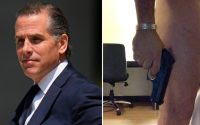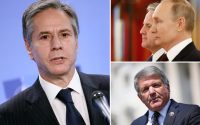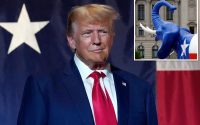Onlookers gasp in court as Hunter Biden plea deal crumbles
WILMINGTON, Del. — Spectators at the federal courthouse here were left stunned Wednesday as first son Hunter Biden’s “sweetheart” plea deal began to collapse — setting off a chain of events that ended in President Biden’s 53-year-old son entering a plea of not guilty to tax and gun charges.
At one point, Hunter’s lawyer Chris Clark threatened to “tear this up right now” if federal prosecutors didn’t meet his conditions — apparently a bid for blanket immunity for his client.
US District Judge Maryellen Noreika, who booked a follow-up court date for August 25, had been expected to quickly sign off on the Biden Justice Department’s deal with Hunter, but instead the proceedings began to break down about 90 minutes into the three-hour hearing.
A gasp emerged from reporters and interested attorneys sitting in the gallery after Noreika asked assistant US attorney Leo Wise if there was an “ongoing” criminal investigation involving Hunter — as Delaware US Attorney David Weiss has consistently said.
Wise replied “yes” and added that if the first son’s defense team thought otherwise, “then there’s no deal.”
Clark responded, “As far as I’m concerned, the plea agreement is null and void” — leaving attendees stunned and causing some journalists to rush out of the courtroom to brief their colleagues.
An attempt to resurrect the deal following a 20-minute break failed when Noreika said she needed time to analyze the terms of the revised bargain.

Hunter was stone-faced throughout the proceedings and passed the time doodling during one exchange between Wise and the judge.
The initial deal crumbled over two sticking points: Whether Hunter could face additional future charges, such as for purportedly working as an unregistered foreign agent; and whether the two misdemeanor counts of willful failure to pay taxes could be decoupled from the felony charge of possessing a weapon while addicted to a controlled substance — in the first son’s case, crack cocaine.



The initial deal crumbled over two sticking points: Whether Hunter could face additional future charges, such as for allegedly working as an unregistered foreign agent; and whether the two misdemeanor counts of failure to pay taxes could be decoupled from the felony charge of possessing a weapon while addicted to a controlled substance — in the first son’s case, crack cocaine.
Under the terms of the unusual agreement, Hunter would only receive two years of probation on the gun charge rather than prison time.
Follow The Post’s latest coverage on Hunter Biden’s plea deal
Noreika repeatedly expressed skepticism of the deal, asking at one point: “Have you ever seen a diversion agreement that is so broad that it encompasses crimes in another case?”
When the judge asked Wise if there was any precedent for such a deal, the prosecutor replied, “No, your honor.”
“If I were to reject the plea, what happens?” Noreika also asked, to which Wise replied that the case would go to trial, with the possibility of additional charges.
“I’m not aware of additional charges,” Clark rejoined. “The US attorney met for five years, going through my client’s taxes on line-by-line basis. They pursued it with unbelievable diligence and doggedness. I don’t think there are any additional charges to be brought.”

Ultimately, both sides agreed that the general parameters of the original deal would remain, and that it would be specified that Hunter would face no continued legal exposure over his failure to pay taxes from 2014 to 2019, his drug use, or illegal gun possession — leaving open the possibility of future criminal counts over foreign lobbying, bribery or other charges related to his dealings in countries such as China and Ukraine.

When asked by the judge why he failed to pay taxes even in years when he was not abusing drugs, Hunter claimed: “In getting my life back together, there was a flood of an enormous amount of problems” that, in his telling, resulting in his failure to pay what IRS agents say was about $2.2 million on $8.3 million in foreign income.
Hunter told the judge that he most recently was treated for alcohol and drug addiction with inpatient rehab in late 2018. He said that his last time using drugs was in June 2019.
The first son later said he stopped using drugs in May 2019 after getting married May 17 of that year. However, he admitted that did have “a drink or two” and claimed June 1, 2019, as his actual sobriety date.
As the hearing reached its conclusion, Noreika several times pressed lawyers on both sides about whether she was merely there to “rubber-stamp” the agreement.
“We’re not asking the court to rubber-stamp anything,” Wise said.
“Well, it certainly seems that way,” the judge shot.

Noreika ultimately decided neither she nor the parties were in a position to move forward, giving the parties 30 days to resubmit the deal with clearer language.
“These agreements are not straightforward, and they contain some atypical provisions,” she noted before telling the attorneys: “I think having you guys talk more makes sense.”
Then, to Hunter: “Without me saying I’ll agree to the plea agreement, how do you plead?”
“Not guilty, your honor,” the first son responded.
A few minutes later, Hunter exited the courthouse flanked by Secret Service, got into a black SUV and took off with a six-car motorcade.


